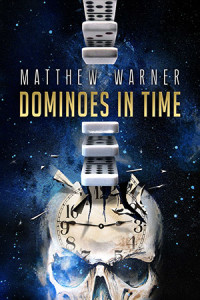Guest Post by Matthew Warner
Dear Dad,
I never told you the details of my one-week stint in a psychiatric unit while in college. You frankly don’t deserve them, but they’re good fodder for this column about how to write emotional dark fiction.
I’m too old to care that this is too personal of a thing to share publicly. I own my skeletons, unlike you. It’s what gives the stories I tell an emotional engine. Characters who connect with readers on a gut level are more compelling than any supernatural horror I can imagine.
Your fecal screed to me of 2003 — the last time you ever spoke to me — sits in my craw. You couldn’t understand why I was so angry with you for cheating on Mom and divorcing her, so you attributed my reaction to mental illness. You wrote, “The mental breakdown that you had in college was when the bull should have been taken by the horns. But, like always, it was brushed under the rug to ‘go away.’ . . . It is clear that when you were medicated during the incident at JMU, the change in your personality was obvious and positive.”
I was so angry with you for cheating on Mom and divorcing her, so you attributed my reaction to mental illness. You wrote, “The mental breakdown that you had in college was when the bull should have been taken by the horns. But, like always, it was brushed under the rug to ‘go away.’ . . . It is clear that when you were medicated during the incident at JMU, the change in your personality was obvious and positive.”
Yeah. A short-term prescription for Navane, an antipsychotic, is what fixed my wagon. What a wonder drug.
You believe that in 1993, I had a psychotic episode, rooted in mental health issues I inherited from your own father. (Of course, you never said you suffer from any issues yourself. I guess manic depression is a recessive gene, huh?)
Here’s what really happened. I was having a hard time adjusting to university life. I felt like an outsider. I was always lonely, desperate to fill the romantic void. I had deep feelings of social inadequacy that dated back to being bullied in elementary school. The things that gave my life shape — my studies, my writing, my piano playing — weren’t enough. Religion might have filled that void, but I was too turned off by the ugly Christian fundamentalism I encountered on campus.
Worst of all, I was terribly anxious of contracting a sexually transmitted disease. Although I couldn’t establish a long-term romance with anyone, I sometimes lured women into the sack. But I would stupidly not use protection, and then I would spend months driving myself down chasms of fear about whether I’d contracted AIDS. I couldn’t tell you about any of this. How could I? You were so judgmental.
You know what? I hadn’t grown up yet. I had issues. I didn’t exit puberty until age twenty-five, just in time for you to leave Mom for your aerobics partner. That’s my excuse.
Shortly before my twentieth birthday, a friend and I went skiing in Canada during spring break. We smoked a little weed and hit the slopes. One day, he brought out some psychedelic mushrooms, which I’d never had before. “These are really good,” he said as I ate them, not revealing that they were laced with amphetamine. Soon, I was not only skiing down the slopes, I was damn near doing cartwheels down them.
When we got home, I came down with bronchitis. And I didn’t take good care of myself. I kept attending classes and not resting. I became sicker.
Finally, I fainted during a music rehearsal at the Methodist youth fellowship. I fell backward off the piano bench and gave myself a concussion on the floor. The paramedics took me across the street to Rockingham Memorial Hospital. They did a blood test, and guess what they found? They assumed I was a drug addict. The ER doctors said they wanted me to get some “mild” counseling, and they would pursue legal channels if I refused. Next thing I knew, I was in the fifth floor psychiatric unit.
During the next week, the concussion and bronchitis improved, and as I came off the heavy medications they gave me, I started to feel like my old self. But something else positive happened during those thrice-daily group therapy sessions with people who’d attempted suicide or who were recovering from overdoses. I seized the opportunity to talk about my problems. I opened up about my anxieties and insecurities. I had private talks with a psychiatrist, who helped me browbeat myself into behaving more responsibly. Over the subsequent months, I may not have transformed into a happy, bushy tailed college boy, but I became a slightly more self-accepting one.
You never considered the possibility I may have taken a step toward maturity. Instead, this episode went onto your scoreboard, detailed in your letter, for Reasons Why Matt Is An Ungrateful Mentally-Ill Son And I’m A Good Father.
We have issues to work out, you and I. If you’re brave enough to read my new collection from Thunderstorm Books and Cemetery Dance Publications, DOMINOES IN TIME, you might appreciate how complex and passionate my feelings are about you. When a writer taps dark emotions, it makes for better dark fiction.
Maybe, Dad, you’ll understand how my stay in the psychiatric unit informed the story “At Death We’ll Not Part.” Maybe you’ll see how your divorcing Mom influenced “Second Wind.”
And hell, maybe you’ll grow up, too.
“Of all that is written, I love only what a man has written with his blood.”
— Friedrich Nietzsche
Visit Matthew Warner at matthewwarner.com.

Wow, Matthew. Just… wow.